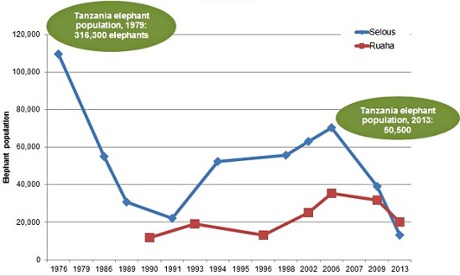China and the Illicit Ivory trade
Abiding by the 1989 international ban on the ivory trade, the Chinese government recently destroyed several tons of pristine tusks and works of ivory art to show its commitment to cracking down. But, as revelations last week of collusion between Chinese traffickers, corrupt Chinese officials, civilian and military, African politicians and businessmen, and poaching cartels, the Chinese government needs to come down even harder on trafficking and corruption.
London-based environmental NGO Environmental Investigation Agency (EIA) released a report stating that more ivory is being shipped out Tanzania than any other African country and Chinese criminal syndicates and officials are involved. About a year ago, EIA’s undercover investigators met a “tight-knit group” of smugglers at the Mwenge market in Dar es Salaam, known as a haven for ivory trading. The sellers worked with a group of Chinese “brothers” who had strong conduits to Guangdong province via the port of Zanzibar.
The EIA even discovered that a couple weeks prior to the state visit of President Xi Jinping to Tanzania in March 2013, Chinese ivory buyers bought out the entire market, saying openly that they were for some parties on President Xi’s entourage of businessmen and officials. After President Xi’s plane landed, the buyers had the audacity of bundling the illicit ivory in diplomatic pouches for shipment back to China on the presidential plane. Apparently, for a time, their buying spree led to the doubling of the black market price of ivory to US$700.
The EIA also accused the Chinese navy of complicity, citing the case of Chinese national Yu Bo who was detained by Tanzanian authorities in December 2013. He was attempting to deliver 81 tusks to two Chinese naval officers on an official visit to the Dar es Salaam port. After paying bribes of $20,000 at an initial checkpoint, he was caught at a second and subsequently sentenced to 20 years for which he has since appealed. One trader bragged he made US$50,000 on a deal with the naval personnel. A month earlier, three Chinese nationals were arrested after a raid on a house in a Dar es Salaam suburb uncovered 706 tusks.
The report similarly pointed to intimate involvement on the part of prominent Tanzanian politicians and businessmen, a secret list of which was submitted to President Jakaya Kikwete by intelligence sources. So far, however, none has been prosecuted due to strong ties to the ruling party. For instance, certain shipping companies implicated in major ivory seizures are run by Abdulrahman Kinana, Secretary General of the Chama Cha Mapinduzi ruling party, but he remains untouched.
Quoted by the Guardian newspaper, EIA executive director Mary Rice said, “This report shows clearly that without a zero tolerance approach, the future of Tanzania’s elephants and its tourism industry are extremely precarious…The ivory trade must be disrupted at all levels of criminality, the entire prosecution chain needs to be systematically restructured, corruption rooted out and all stakeholders including communities exploited by the criminal syndicates and those on the front lines of enforcement given unequivocal support…”
Tanzanian Foreign Minister Bernard Membe denied the report as “…fabricated…to tarnish the image of our country and our friend, the Chinese nation.” Although Chinese Foreign Ministry spokesman Hong Lei labeled the report “baseless”, he did add, “(the Chinese government) attaches importance to the protection of wild animals like elephants (and) we have been cooperating with other countries in this area.” Earlier this year, Mr Lu Youqing, Chinese Ambassador to Tanzania, lamented the role of Chinese nationals in the illicit trade, remarking, “our bad habits have followed us”. (quoted in the Guardian)
The number of African elephants has dwindled from an estimated 1.3 million in 1979 to about 419,000 today, said the EIA. Southern Tanzania’s Selous reserve, a hotbed of ivory poaching, has seen its elephant herd plummet from about 70,000 heads in 2006 to 13,000 last year. In the whole country, there were 142,000 elephants in 2005 but by next year, when President Kikwete is expected to leave office, the population will have dropped to around 55,000.
Whether the report is accurate and credible remains to be seen and in spite of international sanctions against trafficking, Chinese fondness for ivory carvings along with the handicraft industry supplying it will not diminish any time soon. Celebrities such as former NBA superstar Yao Ming have campaigned tirelessly against the poaching of elephants for ivory, rhinoceros for horns, and sharks for fins. But, in the protracted war against illegal ivory, Chinese authorities must be more vigilant to prevent perpetrators getting away with crimes from under their noses.


0 Comments
Trackbacks/Pingbacks